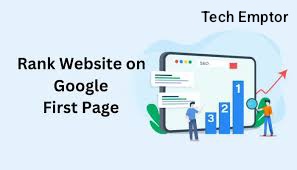
How Can I Rank My Website on Google 2024: In today’s digital age, ranking your website on Google is crucial for online success. Whether you’re a small business, an entrepreneur, or a content creator, your website’s visibility on Google can directly impact your growth and revenue. Ranking higher in search results can drive organic traffic, enhance brand credibility, and ensure long-term success. But the question is, how can you achieve that?
In this guide, we’ll delve deep into the factors that influence your website’s ranking and provide actionable tips to ensure your site ranks higher on Google. So, let’s dive in.
Understanding Google’s Ranking Algorithm
Before jumping into strategies to rank your website on Google, it’s essential to understand how Google’s ranking algorithm works. Google uses complex algorithms that evaluate hundreds of factors when determining where a website should appear in its search results.
The primary goal of these algorithms is to provide the best possible answers to users’ queries. While Google doesn’t reveal its full algorithm, there are some well-known ranking factors that we can focus on:
- Content Quality: Google rewards websites with valuable, relevant, and up-to-date content.
- Backlinks: Having high-quality backlinks from trusted websites can significantly boost your ranking.
- User Experience: Factors like site speed, mobile-friendliness, and an intuitive design are crucial.
- On-Page SEO: Optimizing meta tags, headers, and the use of relevant keywords is key.
- Engagement Metrics: High dwell time, low bounce rates, and user interactions can positively impact your rankings.
1. Create High-Quality, Relevant Content
Content is the backbone of any successful website. To effectively rank your website on Google, you must focus on providing high-quality, informative, and engaging content that answers your users’ questions. Google wants to deliver the most relevant results to its users, so your content needs to match the search intent behind the keywords.
Here are some tips for creating content that helps your site rank:
- Thorough Keyword Research: Use tools like Google Keyword Planner, SEMrush, or Ahrefs to find keywords that are relevant to your niche.
- Write for Humans First: While SEO is important, always write with the user in mind. Content that is easy to read, engaging, and informative will naturally perform well.
- Use Keywords Naturally: Avoid keyword stuffing. Instead, incorporate your primary keyword naturally into your content. For instance, if your main keyword is “rank your website on Google,” use it where it fits smoothly.Example: “If you want to rank your website on Google, it’s essential to focus on both on-page and off-page SEO strategies.”
2. Optimize for On-Page SEO
On-page SEO is the practice of optimizing individual web pages to rank higher on Google. It involves a mix of content optimization and technical adjustments. Here’s how you can make sure your site is optimized for on-page SEO:
- Title Tags: Ensure your title tags are concise, descriptive, and include your primary keyword.
- Meta Descriptions: Write compelling meta descriptions that entice users to click on your link. This should also contain your target keyword.
- Header Tags (H1, H2, etc.): Use header tags to break up your content into sections. Your main keyword should appear in at least one H2 tag.Example H2: How to Rank Your Website on Google in 2024
- URL Structure: Use short and descriptive URLs that include your main keyword.
- Internal Linking: Link to other relevant pages on your site to keep users engaged and improve your SEO.
3. Focus on Technical SEO
Technical SEO is all about ensuring that Google can crawl and index your site efficiently. A technically optimized website will rank higher and perform better in search engine results. Here are some aspects of technical SEO you should focus on:
- Mobile-Friendly Design: Google has switched to mobile-first indexing, meaning your website must be optimized for mobile devices.
- Improve Page Speed: A slow website can hurt your rankings. Use tools like Google PageSpeed Insights to identify areas where you can improve.
- Fix Broken Links: Ensure that all links on your site are working. Broken links create a poor user experience and can negatively impact your SEO.
- Use HTTPS: Having an SSL certificate is now a ranking factor. HTTPS signals to Google that your site is secure.
4. Build High-Quality Backlinks
Backlinks are one of the most important factors to rank your website on Google. A backlink is when another website links to yours, and the quality of these links can significantly influence your ranking. Here are some ways to build high-quality backlinks:
- Guest Blogging: Write guest posts for reputable websites in your niche and include a link back to your site.
- Content Promotion: Promote your content on social media and through email marketing to encourage others to link to it.
- Collaborations and Partnerships: Reach out to other businesses or bloggers in your industry for collaborations that result in backlinks.
5. Improve User Experience (UX)
User experience is increasingly becoming a key factor in determining your website’s ranking. A website that is easy to navigate, visually appealing, and engaging will keep users on the page longer, reducing bounce rates. Here are some ways to improve UX:
- Clear Navigation: Make it easy for users to find what they’re looking for. Organize your content with clear menus and categories.
- Responsive Design: Ensure your website looks good on all devices, including smartphones, tablets, and desktops.
- Engaging Content: Use visuals, infographics, and videos to keep users engaged and encourage them to spend more time on your site.
6. Utilize Local SEO
If you’re a local business or offer services in a specific area, local SEO is vital for helping you rank your website on Google. Google’s local search algorithm takes into account location-based factors to provide users with relevant results. Here’s how to optimize for local SEO:
- Google My Business: Create and optimize your Google My Business profile. Ensure that your business name, address, and phone number (NAP) are consistent across the web.
- Local Keywords: Use local keywords in your content and metadata.Example: “If you’re looking to rank your website on Google in [City], focus on local SEO strategies like optimizing for location-specific keywords.”
- Local Reviews: Encourage satisfied customers to leave reviews on your Google My Business profile and other review platforms.

Conclusion
Ranking your website on Google is a multifaceted process that requires a combination of quality content, technical optimization, and smart marketing strategies. By focusing on creating valuable content, optimizing your on-page and technical SEO, building high-quality backlinks, and improving user experience, you can rank your website on Google and drive organic traffic to your site.
Remember, SEO is a long-term game. While you might not see immediate results, consistent efforts will pay off over time, helping your website climb the ranks on Google’s search results.
FAQs
1. How long does it take to rank a website on Google?
The time it takes to rank your website on Google depends on several factors, including your industry, competition, and the quality of your SEO efforts. On average, it can take anywhere from 3 to 6 months to see significant improvements in rankings.
2. Can I rank my website without backlinks?
While it’s possible to rank your website on Google without backlinks, it’s much more challenging. Backlinks act as a vote of confidence from other websites, signaling to Google that your content is trustworthy and valuable. They play a crucial role in SEO.
3. What is the best tool for keyword research?
There are several excellent tools for keyword research, including Google Keyword Planner, SEMrush, Ahrefs, and Moz Keyword Explorer. These tools can help you find relevant keywords to target and optimize your content for SEO.
4. Does social media help in ranking a website?
While social media signals are not a direct ranking factor, they can help you rank your website on Google indirectly. Social media can drive traffic to your site, increase visibility, and encourage others to link to your content.
5. What is the role of meta descriptions in SEO?
Meta descriptions don’t directly affect your search rankings, but they do impact click-through rates. A compelling meta description can entice users to click on your link, which in turn can improve your site’s engagement metrics and SEO performance.
Read Also: How to Use ChatGPT in Python: A Comprehensive Guide 2024
